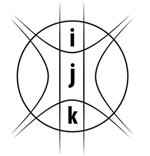To Grasp the Infinite
New dimensions
Abstract
For a long time the science considered the mathematic infinite only quantitatively, but the experience did not confirm the actual existence of the quantitative infinite. In addition the order as the character of numbers was defined on the infinite in Cantor ordinal numbers beside the quantitative properties of the numbers, but the ordinal numbers do not qualitatively distinguish the infinite ones as well.
As we modelled the specific type of mathematic infinite by the imaginary component of the two-element numbers, we set off on a way where the qualitatively different models of infinite meet our general experiences in the real world.
After registration, you may ask for a translation of the full text by email.
The way from the natural numbers through the real numbers to the two-element numbers
The role of the concept of computability in physics
“It would require infinite precision for the coordinates of a phase-space point- i.e. all the decimal places!- in order for it to make sense to say that the point is non-computable. (A number described by a finite decimal is always computable.) A finite portion of .a decimal expansion of a number tells us nothing about the computability of the entire expansion of that number. But all physical measurements have a definite limitation on how accurately they can be performed, and can only give information about a finite number of decimal places. Does this nullify the whole concept of 'computable number' as applied to physical measurements?” (Roger Penrose, The Emperor’s New Mind – Concerning Computers, Minds, and The Laws of Physics, Chapter 5; The classical World, Phase space)
Contents
1. The natural numbers and the qualitative characteristic of infinite
2. The positional numeral systems and the two-element numbers
3. “Actualization” of the potentially infinite – examples in physics
4. Epilogue
Appendix
After registration, you may ask for a translation of the full text by email.
The Infinity which is hiding in the Geometric Algebra
Content
The infinity and the two-element numbers
Infinity differently – a heuristic approach
Infinity described with homogeneous coordinates
The infinity and the geometric algebra
The complex and hyperbolic numbers as two-dimensional Clifford algebras - examples from the literature
The hiding infinity
Abstract
Types of geometric algebra generated by vectors of 1-dimensional vector space are not at all exhibit poor structure. These geometric algebras have very exciting basic structure as they are represented by two-element-numbers which are the complex, the parabolic (dual) and the hyperbolic numbers. On the other hand, special types of infinities – related to the continuum hypothesis – are modeled by the two-element numbers. So it can be said that vectors of 1-dimensional vector space, which generates the above mentioned geometric algebras are nothing more than the infinite extensions of scalars of the geometric algebras.
After registration, you may ask for a translation of the full text by email.
Problems in the Geometric Algebra
In the geometric algebra1 there are some problems, which not found in the literature, and I would like to share my thoughts about these now. I restrict my examination to those geometric algebras, where the starting point is a finite dimensional Euclidean vector space and the real numbers. In the Euclidean vector space an internal product is defined with an outer product generalized by Grassmann. After that, a so-called geometric product, which will be the basic operation in the geometric algebra, is defined.
___________________________________________________
1 See for example the book of Chris Doran - Anthony Lasenby titled Geometric Algebra for Physicists;
http://www.cambridge.org/nl/academic/subjects/physics/theoretical-physics-and-mathematical-physics/geometric-algebra-physicists?format=PB
or an article titled „Imaginary Numbers are not Real — the Geometric Algebra of Spacetime” by Gull-Lasenby-Doran
http://www.researchgate.net/publication/226188504_Imaginary_numbers_are_not_realThe_geometric_algebra_of_spacetime
After registration, you may ask for a translation of the full text by email.



